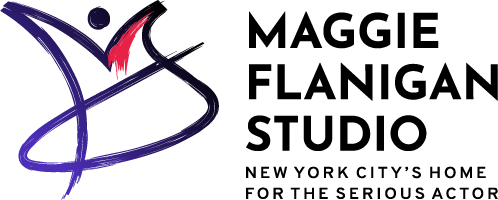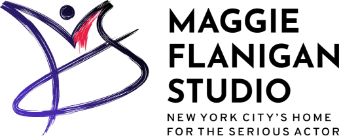APPLY FOR ADMISSION
FIRST YEAR MEISNER ACTING PROGRAM

Begins January 7th, 2025

Call To Schedule an Interview
(917) 794-3878
What is a Monologue in Acting? A Guide for Actors
What is a monologue in acting? Simply put, it’s a long speech by one character that reveals their thoughts, emotions, and motivations. A monologue can be a paragraph, a page, or multiple pages long.
Monologues are a key element in theater, film, and television, giving characters the chance to express themselves without being interrupted by anyone. Monologues often add depth and insight into a character. They can be emotional, funny, or intense, but they always have the power to engage an audience.
Monologues are also essential for auditions early in your career, and are often used in actor training, especially if you are looking for acting classes in NYC. At the Maggie Flanigan Studio, we emphasize the importance of learning how to craft and act out monologues so that our students have a skill set to approach any kind of written material.
In this blog, we’ll break down what makes a great monologue, the different types, and how they can shape your acting career.
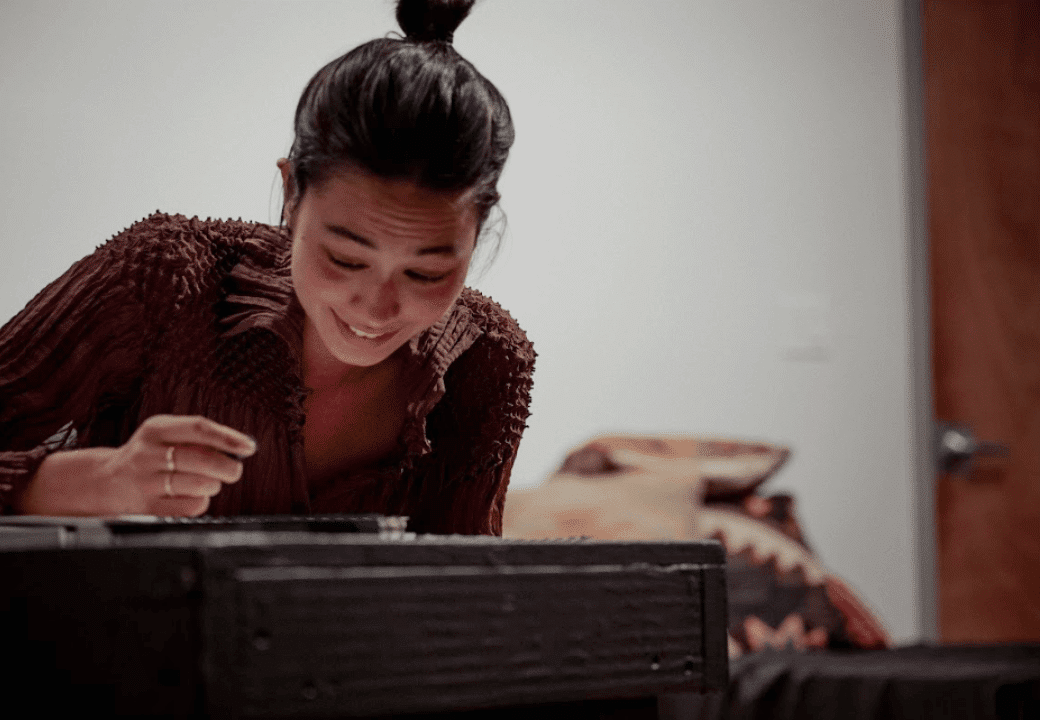
Key Takeaways
- Monologues allow actors to reveal a character’s deepest emotions, motivations, and thoughts, offering powerful moments in theater and film.
- Choosing the right monologue is crucial for auditions, as it showcases an actor’s skill, range, and ability to connect with material.
- Maggie Flanigan Studio’s Meisner-based training prepares actors to deliver authentic, emotionally driven monologues that leave a lasting impression.
What Is a Monologue?
The word “monologue” comes from the Greek words “monos” (alone) and “logos” (speech). In acting, it’s an extended speech delivered by a single character without interruptions.
Monologues appear in plays, films, and television shows, ranging from dramatic moments that drive the story forward to internal monologues that reveal a character’s thoughts. They give actors the chance to explore a character’s innermost feelings and motivations.
A monologue is more than just speaking. It’s an opportunity for the actor to fully embody the character through word choice, voice, and body language. Dramatic or comedic, a well-delivered monologue connects the actor with the audience and leaves a lasting impression.
Different Types of Monologues
Monologues come in many forms, each adding depth to the story and the character. Here’s a look at the different types of monologues and how each serves a unique purpose in storytelling.
Dramatic monologue
Dramatic monologues occur when a character speaks to other characters, often during an emotional or pivotal moment. It reveals key motivations and pushes the story forward, offering a powerful scene that can change the direction of the plot.
Famous monologues from Shakespeare often fit this description, where characters pour out their deepest feelings, their insecurities, and their passion. These monologues come in moments of intense conflict, deep grief, and even the musings and insights of clownish buffoons.
Interior monologue
An interior monologue peels back the layers of a character’s mind, revealing their innermost thoughts and feelings. In these moments, the character may speak directly to the audience or simply reflect silently, sharing secrets, fears, or desires they would never voice to others.
For actors, performing an interior monologue means grappling with thoughts that have never been expressed before. These are often moments of epiphany for the character, offering the audience a rare glimpse into the character’s personal journey.
Active monologue
An active monologue is all about action and intention. The character isn’t just reflecting—they’re on a mission.
They might be persuading someone, expressing a deep need, or making a life-changing decision. There’s a clear objective driving their thoughts. Actors must embody this urgency, making every word resonate with purpose and steering the scene toward a decisive moment.
Narrative monologue
A narrative monologue unfolds like a story, recounting moments from the character’s past.These are moments of reflection and reminiscence. It offers a glimpse into their past experiences, filling in the background that shapes who they have become.
These monologues can be nostalgic, reflective, or even haunting, depending on the anecdote being shared. The actor’s task is to breathe life into these memories, pulling the audience into the character’s past and showing how it echoes into their present.
Linking monologue
A linking monologue acts as the thread that ties scenes together, filling in the blanks and revealing what has happened offstage or off-screen. It keeps the audience connected to the story, providing context that might otherwise be missed.
Although less common today, it’s still used in some plays to maintain the story’s momentum. The actor’s job is to weave this narrative smoothly, holding the audience’s attention and guiding them effortlessly into the next chapter.
Monologue vs. Soliloquy: What’s the Difference?
Monologues and soliloquies are powerful tools that reveal a character’s inner world, but they serve different purposes. Knowing the difference helps actors bring depth to the behavior they create.
A monologue is a speech by one character that is directed at others or the audience. It’s a moment for the character to express their thoughts, emotions, or motivations, often in a powerful, intimate, or persuasive way.
When a character is engaged in a monologue, all eyes are drawn to them, and it is an opportunity for a well-trained, talented actor to carve out a very vivid, and interesting piece of acting. An opportunity to leave a lasting impression on the audience.
A soliloquy is an internal monologue where a character reveals their deepest thoughts, speaking only to themselves.
In Shakespeare’s Hamlet, the famous “To Be or Not to Be” soliloquy explores the meaning of life and death in deep, philosophical ways. It is considered the most famous soliloquy in the English language. Soliloquies give actors the chance to delve into a character’s private struggles, sharing raw emotion directly with the audience.
Why Monologues Matter in Acting

In the beginning of your career, monologues are an important way for actors to show a director, casting director, or agent your acting skills. Most beginning actors do not yet have a demo reel that showcases their ability. Monologues will often function as your calling cards when you first start out.
Here are more reasons why monologues play such a key role in acting.
Skill showcase. A good monologue provides an actor the opportunity to carve out a really interesting and nuanced piece of behavior. No other character has lines, so you have the chance to show your acting chops if you know how to work.
In plays, films, or television shows, monologues are opportunities to reveal something deeper and more meaningful about the character, their pasts, and their relationships.
Auditions. Monologues are often used as audition pieces because they give casting directors a focused look at an actor’s abilities. These short performances highlight an actor’s talent in interpreting a character and expressing emotions, making them essential for auditions.
Character exploration. Monologues offer a window into a character’s inner world, revealing their thoughts and motivations. These moments help actors convey the depth of their character’s journey while giving the audience a deeper understanding of the story.
What Makes a Good Audition Monologue?
I believe that a good audition monologue requires a few things. It’s a tedious process looking for good ones, and no one really wants to do it. You need time to look at television and film, and sift through dozens of plays.
Usually it will require you finding 20-30 monologues in order to find the 2 or 3 that are perfect for you. For a monologue to be memorable, it needs to be short, have emotional depth, purpose, and a unique perspective. Here’s what makes an audition monologue truly stand out.
Emotional arc
A good audition monologue should have a clear beginning, middle and end. The piece should start somewhere, and take us through a small journey that ends on a clear beat.
What is the emotional arc of the piece? How can I begin so that when I’m done, I’ve actually lived through something. Avoid monologues that are one note, without a clear journey.
Avoid an abundance of vulgarity
When figuring out how to find a good audition monologue, you must always remember that this is your chance at a first impression. Think of it the way you would on a first date, you don’t want to offend or put anyone off.
Stay away from monologues that are heavy in vulgarity, racism, misogyny, or littered with one curse word after another. The last thing you want to do is offend the people you are auditioning for.
These kinds of monologues might work well in the play or film, but taken out of context for an audition monologue turns it into something unnecessarily offensive.
Avoid iconic characters or award winning performances
Never walk into an audition room and say you are doing Jesse from Breaking Bad, or Carmella from the Sopranos. Stay away from any iconic character, or award winning performance.
You are never going to do it better than them, and all anyone will be doing is wondering why the hell you would be so brazen as to even pick this. You’ll be immediately compared to the original. So avoid these completely.
You want to find those roles that are really well written, and if you are choosing from a very popular or highly regarded show or play, look for the supporting parts, or the amazing guest roles that might have had a great monologue. Those are the gems that no one else will have.
Fresh choices and current material
Look for the best material from the last five years. What you choose says just as much as how you do it.
Find those writers who have buzz, those playwrights that are being produced all over the country, the screenwriters who are developing fresh original content. It will show a casting director that you are up to date on the art form, and not a lazy actor who was sifting through a monologue collection and pulling something out from 1985 that’s been done thousands of times.
You want to find those monologues that no one else has.
Don’t make them guess
A good audition monologue should be clear from the beginning. If you are three lines in, and we don’t know what’s going on or who you are talking to, no one will follow you.
A casting director will lose interest immediately. They don’t want to have to work to figure out what the hell is going on. So make sure your monologue is about one thing. If you start the monologue off talking about your grandmother’s death, and halfway through you are breaking up with someone, this is not a good audition monologue. So make sure it’s about one thing.
It should be clear from the beginning what the circumstance is, who you are talking to, and what the piece is about. Make sure the piece is active and that the objective is clear.
Length and pacing
For auditions, a 60 to 90-second monologue is ideal. This length gives you enough time to make an impact without losing the audience’s attention. And the truth is that whoever is watching you has made a decision about you in the first 15 seconds. It’s just a courtesy to let you finish, so don’t annoy the room by doing a 2 or 3 minute monologue.
Focus on delivering each moment with purpose, and make sure your pacing allows for emotional shifts while keeping the monologue dynamic.
Source material
A blend of classical and contemporary pieces in your repertoire is a great strategy. You should have a mix of theater, television, and film.
Classical works, like those by Shakespeare, give you a chance to showcase your command of language and skill with dialogue. Only use them when you are auditioning for something classical. Contemporary monologues, on the other hand, will be used more often, and these should show you off really well.
Stay away from crazy characters, or intense emotional pieces. No one wants to see you at your most enraged or most devastated. You definitely want an emotional underpinning, but stay away from material that is going to require a level 10 emotional response. No one wants to sit and watch that during an audition.
Choose the material and the roles that you could realistically be doing right now, not 20 years down the road. Having both options ensures you’re ready for any audition, no matter the setting or character.
Monologue Training at Its Best with Maggie Flanigan Studio
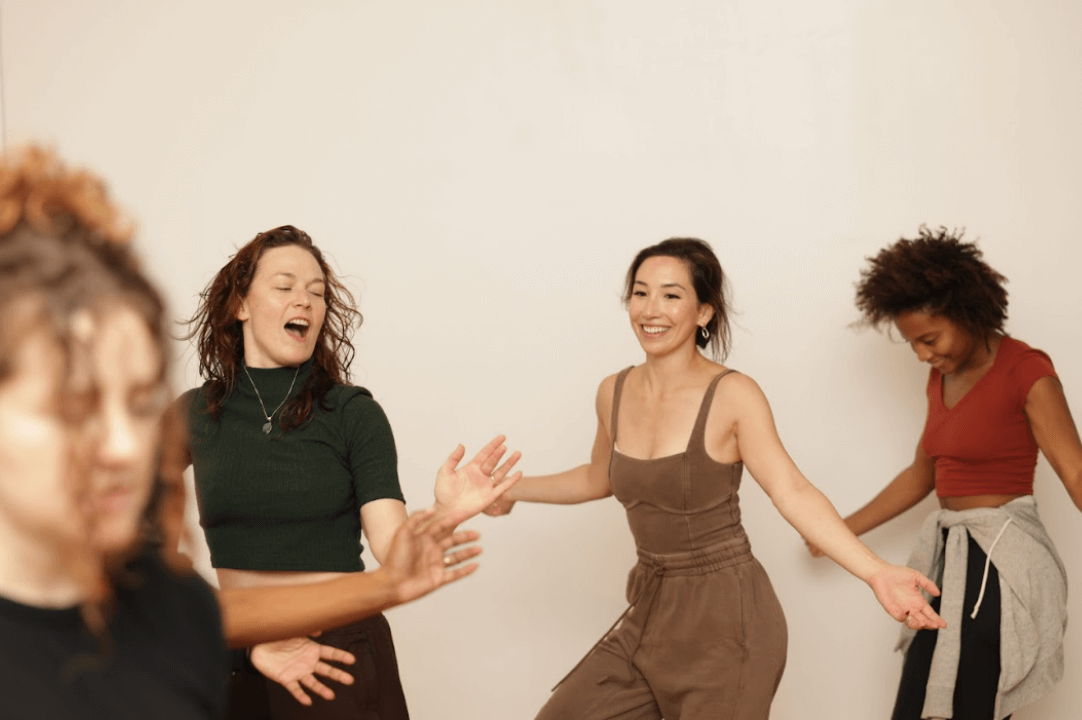
At the Maggie Flanigan Studio, monologue training is a core part of developing a strong, well-rounded actor. Our Meisner-based approach helps students explore the deeper emotional and psychological layers of a character.
Here’s how we help actors master the art of the monologue.
Holistic training approach: We emphasize connecting with the character’s innermost thoughts and motivations, teaching actors to deliver good monologues with authenticity and emotional depth. Each piece becomes a chance for actors to express ideas and insights that drive the scene.
Curriculum offerings: Our Two-Year Conservatory Program offers essential courses like Voice & Speech, Movement, and Script Analysis to prepare actors for both classical and contemporary monologues.
These classes ensure students fully embody their characters, using body language, voice, and eye contact to engage with other characters and the audience.
Professional actor training program: Offering MFA-level training, our Professional Actor Training Program prepares students to deeply analyze monologues, express character motivations, and push the plot forward. Students learn to bring every speech to life, focusing on detail, emotion, and purpose.
Expert faculty: Our seasoned instructors offer personalized coaching. We help students select and prepare monologues that showcase their strengths while challenging them to grow. With expert feedback, students learn how to turn a simple speech into a captivating performance.
Comparative advantage: With a rigorous curriculum and competitive pricing, the Maggie Flanigan Studio is the ideal choice for serious actors. Our comprehensive training equips students for both stage and screen, focusing on emotional truth and powerful performances, without breaking the bank.
Take the Next Step in Your Acting Journey
At the Maggie Flanigan Studio, we know that mastering monologues is just the beginning of building a lasting acting career. Our training will equip you with the skills, depth, and confidence to tackle any role, from the stage to the screen.
If you’re ready to unlock your potential and push your craft further, we’re here to guide you.
Call us today to learn more about our programs and take the next step in your acting journey. Let the Maggie Flanigan Studio help you become the actor you’re meant to be.
Summary
Monologues give actors the chance to dive deep into a character’s emotions, engage with other characters, and capture the audience’s attention. They are a crucial part of any actor’s toolkit as it helps bring out the depth and complexity that makes performances memorable.
At the Maggie Flanigan Studio, our Meisner-based training helps actors develop these skills, teaching them to approach monologues with emotional honesty and precision. Our programs challenge you to dig deeper into your craft and explore new dimensions of your talent.
If you’re ready to grow as an actor and embrace the power of monologue work, we invite you to join us and take your performance to the next level.
Frequently Asked Questions
What is a monologue for an actor?
A monologue for an actor is an extended speech where a character shares their thoughts, emotions, or motivations. It can be directed at other characters, the audience, or even delivered as an internal reflection.
This helps the actor fully embody the character while showcasing their emotional depth and skill in theater, film, or television.
What is an example of a monologue?
An example of a monologue is found in A Few Good Men, where Colonel Jessup famously declares, “You can’t handle the truth!”
In this intense speech, the character defends his actions, revealing his motivations and beliefs. It gives the actor a moment to showcase the character’s fierce conviction and moral complexity.
What is the purpose of a monologue?
The purpose of a monologue is to provide insight into a character’s emotions, thoughts, and motivations.
It allows the actor to express ideas and push the plot forward by revealing something significant about the character, either through direct dialogue with other characters or by talking directly to the audience in a reflective moment.
Recent Post
STUDENT TESTIMONIALS
“I was placed in the intense reigns of Charlie Sandlan. I became a better artist, actor, friend, sibling and daughter because of the studio. Even now, I crave the studio every day. What I learned is present in my work every day. I truly believe in everything they stand for.”

“Maggie taught me that I could control my work, my acting, and to throw all of the bullshit out that I had in my head about ‘what I should be doing’ and to just listen and respond honestly, in the moment. She gave me a craft. She is, quite simply put, THE BEST.”
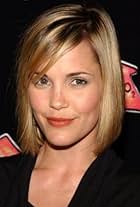
“Maggie Flanigan taught me the true meaning of artistry, passion, and professionalism. I am certain that I continue to work as an actress because of my training with Maggie. At every audition and every performance, her guiding voice is with me. It is a gift beyond measure.”

“Maggie Flanigan is uncompromising, her instincts as a teacher are razor sharp. She doesn’t miss a beat”

“Maggie Flanigan has been one of the most important people in my artistic life. I want to work with Maggie trained actors. As an actor myself, she is my first source. I do not say this lightly, if you are serious about acting, and willing to work very hard, then go to Maggie.”

“Maggie helped me find my sense of truth, an actors greatest asset. Maggie is an expert at instilling that vital ingredient, which allows an actor’s potential to become limitless. My work will forever be rooted in the clarity and honesty she helped me develop.”

“After working for ten years, I did the 2 year program, and now feel that I have the tools I need to become the actor I’ve always dreamed of being. Maggie Flanigan instilled in me a clear sense of truth and a standard of perfection. I am a better actor because of this studio.”

“As an actor, the core of what you have to rely on is your sense of truth and humanity. Maggie allowed me to discover and embrace mine. Trusting my sense of humanity and truth has given me the ability to take risks in my work and my career decisions.”

“Maggie Flanigan has the unique ability to get an actor to the essence of what is true in a moment. She creates a safe and caring environment in which to work.”

“Maggie Flanigan introduced me to my own spirit and my own sense of Truth. Her passion for teaching and ability to communicate are rare gifts to any actor looking for a technique to set his or her talent free. Maggie’s voice has been the one constant guide in my career.”

